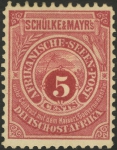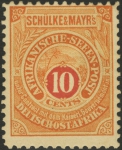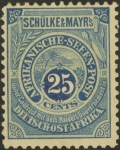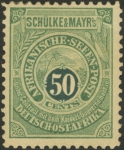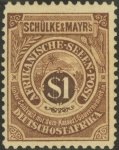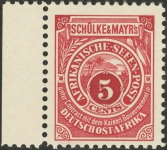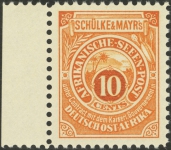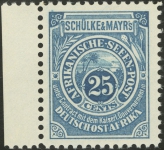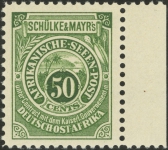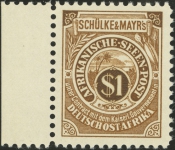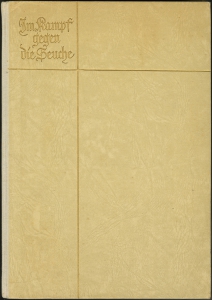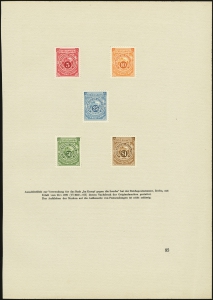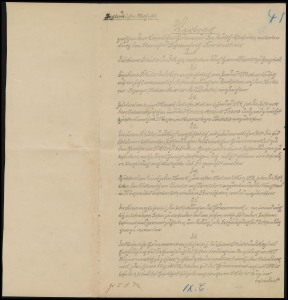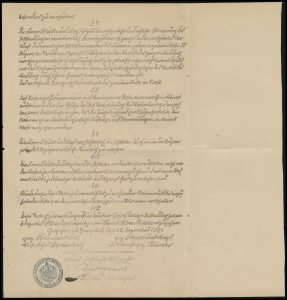Schülke & Mayr Issues
In 1891, the government of German East Africa contracted with the Schülke & Mayr Company to provide mail service along a route from Dar-es-Salaam to Muansa and Bukoba on Lake Victoria, via Kilossa-Mpapua-Tabora. In 1892, this set (MiNr. Sa-Se) was produced for use with this service.
Due to difficulties with the service, the contract was not renewed the following year, and the stamps were never issued for use.
In 1939, the Schülke & Mayr set was reprinted (3,000 sets) to commemorate the 50th anniversary of the Schülke & Mayr Company. The reprints (MiNr. SNaa-SNae) were printed in the original colors, but lack the burelage of the originals and feature a different perforation (L10.75 vice the original L11.5).
They can be found at Page 85 of the commemorative book, Im Kampf gegen die Seuche (In the Fight Against Disease).
Show below is an original hectographed copy of the contract between the Imperial German Government and Schülke & Mayr.
A full translation is as follows:
Certified Copy
Contract
Between the Imperial Governor of German East Africa, represented by the Chief Legation Councilor Sönnenschein
and
the Schülke and Mayr Company, represented by Mr. Blümke at Zanzibar
§1.
From January 1892, the Schülke and Mayr Company makes a provisional commitment to set up a monthly postal service from Dar-es-Salaam to Victoria-Nyanza (Muanza or Bukoba station) for a period of one year.
§2.
On the 6th of each month, beginning on 6 January 1892, the mail is to leave Dar-es-Salaam and arrive in Muanza or Bukoba via Condoa, Mpapua, Tabora, within 50 days at the latest.
§3.
The Schülke and Mayr Company is obliged to send, with each monthly post, up to 50 kg of mail of the Imperial government destined for the interior. Likewise, the Company may transport postal items exceededing this weight, but then a special remuneration must be granted in accordance with §6.
§4.
At the latest on the 1st of each month, for the first time on 1 March 1892, the postmen must start the return march from Bukoba to Dar-es-Salaam and arrive there, again in 50 days at the most, via the same places as those mentioned in §2.
§5.
The Company undertakes to send government mail, whenever possible, at a special cost and to keep it separate from mail destined for other persons, thereby avoiding any damage to the mail.
§6.
The Imperial Government undertakes to pay the Schülke and Mayr Company a fee of 400 Rupien per month as compensation for setting up the postal service, payable after receipt on the 1st of each calendar month, initially on 1 April 1892. If the Government has more than 50 kg transported, the Company is to be paid 40 Rupien for each additional 10 kg or part thereof.
§7.
The Schülke and Mayr Company is responsible for the timely and correct delivery of the postal items. In the case of late departures and late arrival of monthly postal loads, the Company will be deducted 50 Rupien for each individual case, 75 Rupien in the case of loss of a postal item and a full monthly compensation in the case of loss of the entire shipment, unless the Company can provide proof that the delay or the loss of the shipment was caused by force majeure. The above paragraph only comes into effect with the second trip.
§8.
The Imperial Government will issue letters of safe conduct to the individual postmen and commend them to the protection and support of the station masters and will see to it that the mail carriers are in no way diverted from their duties by other assignments and uses during their stay in the stations.
§9.
The Schülke and Mayr Company will identify the postmen as such with an eye-catching badge.
§10.
The Schülke and Mayr Company will provide the postmen with logbooks, which the Imperial officials at the individual stations must inspect and note the time of each arrival and departure.
§11.
Amendments to this contract, namely the stations to be transited and the deadlines to be observed, are reserved for a special later agreement.
§12.
This contract is provisionally valid for a period of one year, the last postal item to be sent on 6 December 1892, from Dar-es-Salaam, or from Bukoba on 1 February 1893.
Executed at Zanzibar, 22 December 1891.
signed Sönnenschein, Imperial Legation Counselor
signed Schülke and Mayr, by power of attorney, signed Blümke
For correct transcript
//–signature–//
Bureau Chief
Set Date(s)
Watermark(s)
None
Album Page(s)
Schülke & Mayr Issues
In 1891, the government of German East Africa contracted with the Schülke & Mayr Company to provide mail service along a route from Dar-es-Salaam to Muansa and Bukoba on Lake Victoria, via Kilossa-Mpapua-Tabora. In 1892, this set (MiNr. Sa-Se) was produced for use with this service.
Due to difficulties with the service, the contract was not renewed the following year, and the stamps were never issued for use.
In 1939, the Schülke & Mayr set was reprinted (3,000 sets) to commemorate the 50th anniversary of the Schülke & Mayr Company. The reprints (MiNr. SNaa-SNae) were printed in the original colors, but lack the burelage of the originals and feature a different perforation (L10.75 vice the original L11.5).
They can be found at Page 85 of the commemorative book, Im Kampf gegen die Seuche (In the Fight Against Disease).
Show below is an original hectographed copy of the contract between the Imperial German Government and Schülke & Mayr.
A full translation is as follows:
Certified Copy
Contract
Between the Imperial Governor of German East Africa, represented by the Chief Legation Councilor Sönnenschein
and
the Schülke and Mayr Company, represented by Mr. Blümke at Zanzibar
§1.
From January 1892, the Schülke and Mayr Company makes a provisional commitment to set up a monthly postal service from Dar-es-Salaam to Victoria-Nyanza (Muanza or Bukoba station) for a period of one year.
§2.
On the 6th of each month, beginning on 6 January 1892, the mail is to leave Dar-es-Salaam and arrive in Muanza or Bukoba via Condoa, Mpapua, Tabora, within 50 days at the latest.
§3.
The Schülke and Mayr Company is obliged to send, with each monthly post, up to 50 kg of mail of the Imperial government destined for the interior. Likewise, the Company may transport postal items exceededing this weight, but then a special remuneration must be granted in accordance with §6.
§4.
At the latest on the 1st of each month, for the first time on 1 March 1892, the postmen must start the return march from Bukoba to Dar-es-Salaam and arrive there, again in 50 days at the most, via the same places as those mentioned in §2.
§5.
The Company undertakes to send government mail, whenever possible, at a special cost and to keep it separate from mail destined for other persons, thereby avoiding any damage to the mail.
§6.
The Imperial Government undertakes to pay the Schülke and Mayr Company a fee of 400 Rupien per month as compensation for setting up the postal service, payable after receipt on the 1st of each calendar month, initially on 1 April 1892. If the Government has more than 50 kg transported, the Company is to be paid 40 Rupien for each additional 10 kg or part thereof.
§7.
The Schülke and Mayr Company is responsible for the timely and correct delivery of the postal items. In the case of late departures and late arrival of monthly postal loads, the Company will be deducted 50 Rupien for each individual case, 75 Rupien in the case of loss of a postal item and a full monthly compensation in the case of loss of the entire shipment, unless the Company can provide proof that the delay or the loss of the shipment was caused by force majeure. The above paragraph only comes into effect with the second trip.
§8.
The Imperial Government will issue letters of safe conduct to the individual postmen and commend them to the protection and support of the station masters and will see to it that the mail carriers are in no way diverted from their duties by other assignments and uses during their stay in the stations.
§9.
The Schülke and Mayr Company will identify the postmen as such with an eye-catching badge.
§10.
The Schülke and Mayr Company will provide the postmen with logbooks, which the Imperial officials at the individual stations must inspect and note the time of each arrival and departure.
§11.
Amendments to this contract, namely the stations to be transited and the deadlines to be observed, are reserved for a special later agreement.
§12.
This contract is provisionally valid for a period of one year, the last postal item to be sent on 6 December 1892, from Dar-es-Salaam, or from Bukoba on 1 February 1893.
Executed at Zanzibar, 22 December 1891.
signed Sönnenschein, Imperial Legation Counselor
signed Schülke and Mayr, by power of attorney, signed Blümke
For correct transcript
//–signature–//
Bureau Chief
Set Date(s)
Watermark(s)
None

